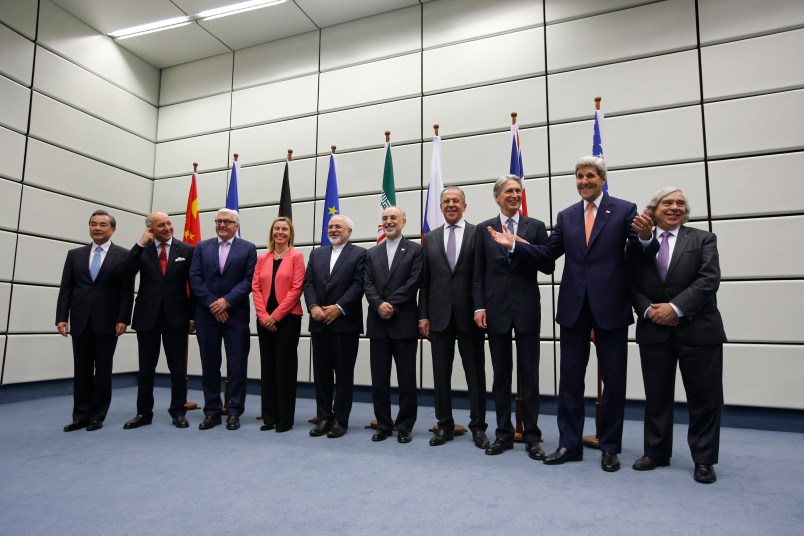With all the commentary about the Iran, it is worth noting that there is an argument against the deal. It’s just not one that most opponents feel able or comfortable making publicly. It goes something like this.
The ideal of course is that Iran permanently foreswear nuclear weapons or any nuclear research and development at all, a not terribly realistic hope. But short of that, the real argument goes something like this: Even if Iran can’t build a nuclear weapon for a decade or two, it will get an immediate influx of money and the ability to build a much more thriving economy freed from the weight of decades of sanctions and the especially onerous ones in place in the last few years. In addition, the regime itself will, shall we say, be koshered on the international stage.
For all the trouble Iran makes now for Israel and the Sunni Arab states it is still a pariah state, with no great power patron (though some measure of protection from Russia), limited ability to purchase weapons and an enfeebled economy. Changing all that is a loss for its regional rivals.
Then there’s a potential even greater threat that comes into play if the agreement is in fact successful.
The history of the last thirty-years in the Middle East cannot be understood without reference to how the US-Saudi alliance changed after the Iranian Revolution. The US-Saudi relationship goes back to FDR, who famously met the founder of the Saudi state, Ibn Saud, in February 1945. But until 1979, the US had an equally deep relationship with Iran. Playing the two rivals off against each other was sometimes explicit but always a subtext of this triangular relationship. When Iranians overthrew the Shah and Iran became irredeemably hostile, Washington lost significant room for maneuver in the region. It was forced to dramatically intensify its relationship with Riyadh. If you go back to 1979, the year both of the Iranian Revolution and the Soviet invasion of Afghanistan, you can see how both events tangled together to lead 22 years later to the events of 9/11.
In any case, implacable hostility between Tehran and Washington is the sheet anchor of the post-1979 US-Saudi relationship. In that sense, the possibility of US-Iranian detente is genuinely threatening. And this applies to various other Sunni Arab states as well. The situation with Israel is much more complex. But there are deep similarities there too.
Now, if Iran just doesn’t obviously violate the nuclear accords but remains basically the regime it is today, these folks don’t have much to worry about. But say the liberalization some hope for does take hold. The regime isn’t overthrown but becomes less repressive, a more responsible regional actor. This is hardly beyond the realm of possibility. Should that happen, there are many good arguments for why the US actually has more common interests with Iran than Saudi Arabia. At least the US would have more options. And that is a genuine threat to the Saudis, especially to those (dominant in the regime) who see the Saudi/Sunni-Iran/Shia conflict as total and permanent.
The truth is that three or four nuclear devices don’t get you ** that ** much. They need to be reliable. You need to be able to deliver them. And of course you need to be able to deal with the consequences of using them against countries that have many more warheads, better ones and far greater ability to deliver them. This is why the generals in the IDF, though deeply fearful of an Iran with nuclear weapons, nonetheless feel it is a challenge they can manage with deterrence. Israel has a massive nuclear arsenal and the ability to deliver them (from deep running submarines) even after a doomsday scenario in which everyone in the country had been annihilated.
The best argument against the nuclear deal is that it is better to keep Iran as a pariah state, with an abiding mutual hostility with the world’s great power, the United States, and still enfeebled by US sanctions, even at the risk of Iran building a handful of nuclear weapons. For the way many Saudis see the world this isn’t only the best argument, it’s actually a decent argument. For the Israelis, it’s considerably more complex. But there’s some logic to it there as well. I certainly do not blame the Israelis for vastly preferring a world where Iran has zero nuclear weapons – let’s not forget: THAT’S WHAT THIS DEAL DOES. But Israel’s generals do not think Iran will launch an unprovoked first strike against Israel to bring on the end times. That’s not Israel’s real problem. Setting aside the abiding issue of the Palestinian conflict, Israel’s real problem is that Iran subsidizes and arms proxy armies to Israel north and south. The situation with Hamas and Gaza is considerably more complex than that. But with Hezbollah it very much captures the situation. Hezbollah is a vastly more lethal force than anything Hamas has or can do in Gaza. In any case, it is obviously a complex reality. But the point is simple enough: a legitimized and wealthier Iran which does not change its behavior presents real challenges to all its neighbors.
Now, when I say this is the best argument, I’m not saying it’s a good argument. I think it’s shortsighted and based more on emotion than reason. But it’s an argument that has a logic behind it and one that does not rely on nonsensical or tendentious claims. It’s just one that few are willing to argue out loud.
With Benjamin Netanyahu, there’s little reason to think he has a Plan B or a rational plan for what comes afterwards if he wins this battle. Nothing about the man would suggest he does. He’s all tactics, with little thought for what comes decades, let alone years later. Everything is for the moment.






